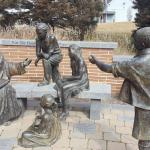
God is love. Where love is found, an image and likeness of God is also to be found. On our part, when we see and encounter an image of God, we should honor it for what it is, a representation of God. This, of course means, we realize what we honor is not God. Honoring the image of God for the sake of God already means we know there is a distinction between it and God. This is why it is not idolatry when we honor something for the sake of God, because the honor is not for the sake of the object as if it were God, but rather, the honor is given to God through the object in question. Similarly, if we disrespect God’s image, we also show disrespect for God. The way Jesus describes the last judgment rests on this principle, which is why those who help people in need are shown to be honoring the judge (who is Christ, and therefore also God), while those who harm people in need are shown to be dishonoring the judge (cf. Matt. 25:31-46). Thus, as God is love, we should honor love, both by loving love, but also by imitating God and representing love in and through our actions.
Paul, therefore exhorts us to be strong in the faith so that we can do all things in love. “Be watchful, stand firm in your faith, be courageous, be strong. Let all that you do be done in love” (1 Cor. 16:13-14 RSV). When we love, we participate in God’s uncreated energies. That is, through love, we unite ourselves to grace, and with such grace, we are able to become stronger, bolder, and that much more capable of following through with what God expects of us. The more love transforms us, the more we will be like God by serving others in and through that love. Love does not make us boastful or proud, looking out only for ourselves; rather, it makes us humble, looking after others and their needs. Those who put a holy faith into practice do not seek to lord it over others; instead, they seek to lift others up, acting as their servants, doing what they can for the sake of others instead of looking for what others can do for their sake. And when we see someone who acts in this way, someone who so completely unites themselves to love that all they do manifest such servitude for others, we should honor them like Paul did to those who acted with such selfless love in his own time:
Now, brethren, you know that the household of Stephanas were the first converts in Achaia, and they have devoted themselves to the service of the saints; I urge you to be subject to such men and to every fellow worker and laborer. I rejoice at the coming of Stephanas and Fortunatus and Achaicus, because they have made up for your absence; for they refreshed my spirit as well as yours. Give recognition to such men (1 Cor. 16:15-18 RSV).
Paul gave recognition to those who helped him, those who showed their strong faith and love by the way they served him and the rest of the faithful. He told us that when we see such holy people, people who selflessly give of themselves to others while not being concerned about their own wants and needs, we should similarly towards them. They should have others taking care of them, making sure their needs are met, because they are so lost in love that they lose sight of themselves and their own needs. Indeed, if we truly embraced the faith, if we truly embraced love so much that we died to the self, this is what we would be doing for each other already. This is what Christians should be like, loving one another and the whole world so that no one could question the presence of God in the midst of them. If we were concerned for the needs of each other instead of our own needs, we would find that everyone would have their needs met, that no one would be found wanting of necessities. That we find people lacking essentials for their lives shows that this mutual love is not being embraced; instead, too many Christians have been led to be selfish, looking after themselves and their own wants and needs above others. Christians have wandered far from the purity of the faith and its expectations. Their spiritual life is impoverished by their greed.
“If any one has no love for the Lord, let him be accursed” (1 Cor. 16:22a RSV). If we truly love the Lord, we would love the image and likeness of the Lord wherever it is found. We would love love, and with it, we would love all those who engage life in the purity of love. If we do not love love, we do not love the Lord who is love. The more we love, the more we reveal the image of God within us. Of course, that image is often covered up and obscured by sin. It can be difficult to love others because we do not see the image in them, but yet we must recognize it is not because it is not there, but because it has been obscured. The more we embrace the path of love, the easier it will be to love others. For, the more we love, the more we will be cleansed of our own sins, and the more purified we become, the more we will realize it was our own sins which hindered us from loving others. We will find that the same stains which covered us cover others; as they were proven ephemeral in us, we will know they are ephemeral in others. Love is stronger than sin, indeed, stronger than death itself, so that when confronted not only with the image of love but the God who is love, Hades gave way to love, freeing all those held in its grasp. Those who do not love, those who cut themselves off from love, are accursed due to their own actions, for without love, and the glory of love, grace, one has life without glory, life without beatitude, life that is as it were a living death or hell itself. We curse ourselves when we cut ourselves from love, but as God came to us to take us out of the grip of Hades, so God can encounter us in our personal hell, show us the fullness of love, and offer us the beatitude which we have previously rejected. We can go from unlove and the hell which we have created for ourselves to love and the glory of the divine life. We can be restored not only to life, but to love, and from love, we are given the means to unite with the God who is love and participate in the divine life. This is what we were created for. This is what life is for. To love and be loved and to be glorified in the unity of that love.
Stay in touch! Like A Little Bit of Nothing on Facebook.
If you liked what you read, please consider sharing it with your friends and family!












